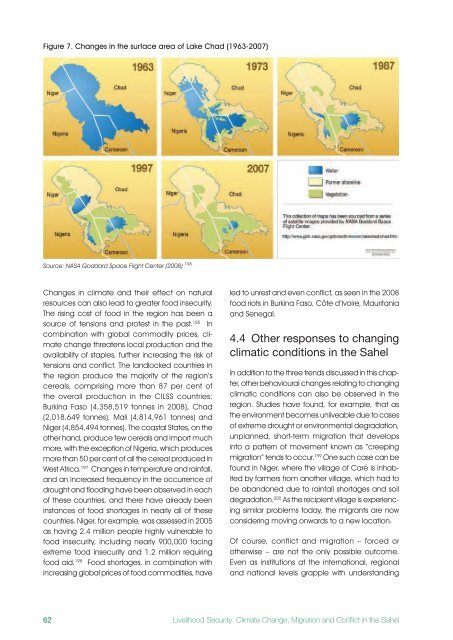Livelihood Security: Climate change, conflict and migration in - UNEP
Livelihood Security: Climate change, conflict and migration in - UNEP
Livelihood Security: Climate change, conflict and migration in - UNEP
Create successful ePaper yourself
Turn your PDF publications into a flip-book with our unique Google optimized e-Paper software.
Figure 7 . Changes <strong>in</strong> the surface area of Lake Chad (1963-2007)<br />
Source: NASA Goddard Space Flight Center (2008) 196<br />
Changes <strong>in</strong> climate <strong>and</strong> their effect on natural<br />
resources can also lead to greater food <strong>in</strong>security.<br />
The ris<strong>in</strong>g cost of food <strong>in</strong> the region has been a<br />
source of tensions <strong>and</strong> protest <strong>in</strong> the past. 185 In<br />
comb<strong>in</strong>ation with global commodity prices, climate<br />
<strong>change</strong> threatens local production <strong>and</strong> the<br />
availability of staples, further <strong>in</strong>creas<strong>in</strong>g the risk of<br />
tensions <strong>and</strong> <strong>conflict</strong>. The l<strong>and</strong>locked countries <strong>in</strong><br />
the region produce the majority of the region’s<br />
cereals, compris<strong>in</strong>g more than 87 per cent of<br />
the overall production <strong>in</strong> the CILSS countries:<br />
Burk<strong>in</strong>a Faso (4,358,519 tonnes <strong>in</strong> 2008), Chad<br />
(2,018,649 tonnes), Mali (4,814,961 tonnes) <strong>and</strong><br />
Niger (4,854,494 tonnes). The coastal States, on the<br />
other h<strong>and</strong>, produce few cereals <strong>and</strong> import much<br />
more, with the exception of Nigeria, which produces<br />
more than 50 per cent of all the cereal produced <strong>in</strong><br />
West Africa. 197 Changes <strong>in</strong> temperature <strong>and</strong> ra<strong>in</strong>fall,<br />
<strong>and</strong> an <strong>in</strong>creased frequency <strong>in</strong> the occurrence of<br />
drought <strong>and</strong> flood<strong>in</strong>g have been observed <strong>in</strong> each<br />
of these countries, <strong>and</strong> there have already been<br />
<strong>in</strong>stances of food shortages <strong>in</strong> nearly all of these<br />
countries. Niger, for example, was assessed <strong>in</strong> 2005<br />
as hav<strong>in</strong>g 2.4 million people highly vulnerable to<br />
food <strong>in</strong>security, <strong>in</strong>clud<strong>in</strong>g nearly 900,000 fac<strong>in</strong>g<br />
extreme food <strong>in</strong>security <strong>and</strong> 1.2 million requir<strong>in</strong>g<br />
food aid. 198 Food shortages, <strong>in</strong> comb<strong>in</strong>ation with<br />
<strong>in</strong>creas<strong>in</strong>g global prices of food commodities, have<br />
62<br />
led to unrest <strong>and</strong> even <strong>conflict</strong>, as seen <strong>in</strong> the 2008<br />
food riots <strong>in</strong> Burk<strong>in</strong>a Faso, Côte d’Ivoire, Mauritania<br />
<strong>and</strong> Senegal.<br />
4.4 Other responses to chang<strong>in</strong>g<br />
climatic conditions <strong>in</strong> the Sahel<br />
In addition to the three trends discussed <strong>in</strong> this chapter,<br />
other behavioural <strong>change</strong>s relat<strong>in</strong>g to chang<strong>in</strong>g<br />
climatic conditions can also be observed <strong>in</strong> the<br />
region. Studies have found, for example, that as<br />
the environment becomes unliveable due to cases<br />
of extreme drought or environmental degradation,<br />
unplanned, short-term <strong>migration</strong> that develops<br />
<strong>in</strong>to a pattern of movement known as “creep<strong>in</strong>g<br />
<strong>migration</strong>” tends to occur. 199 One such case can be<br />
found <strong>in</strong> Niger, where the village of Caré is <strong>in</strong>habited<br />
by farmers from another village, which had to<br />
be ab<strong>and</strong>oned due to ra<strong>in</strong>fall shortages <strong>and</strong> soil<br />
degradation. 200 As the recipient village is experienc<strong>in</strong>g<br />
similar problems today, the migrants are now<br />
consider<strong>in</strong>g mov<strong>in</strong>g onwards to a new location.<br />
Of course, <strong>conflict</strong> <strong>and</strong> <strong>migration</strong> – forced or<br />
otherwise – are not the only possible outcome.<br />
Even as <strong>in</strong>stitutions at the <strong>in</strong>ternational, regional<br />
<strong>and</strong> national levels grapple with underst<strong>and</strong><strong>in</strong>g<br />
<strong>Livelihood</strong> <strong>Security</strong>: <strong>Climate</strong> Change, Migration <strong>and</strong> Conflict <strong>in</strong> the Sahel

















